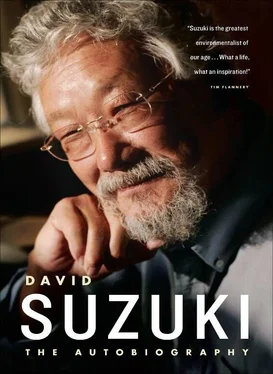Canada boasts of its high ideals of democracy and all the rights that are guaranteed by its Charter of Rights and Freedoms, but many have been hard won — for example, the right of visible minorities to vote, own property, attend university, or even to drink in a pub — and some have yet to become part of the accepted rights of all citizens. Even today, we are grappling with the recognition that gay people, transsexuals, and hermaphrodites as human beings deserve full legal rights, including the right to marry. Canadians have been prepared to fight and die for those principles. Yet by invoking the War Measures Act in 1942, the government declared that race alone was a sufficient threat to Canadian security to revoke all rights of citizenship for Canadians of Japanese descent.
One of the terrible dilemmas of democracy is that only under conditions of duress or crisis do those cherished rights even matter, but that's when they are often rescinded in the name of national security. What good are high ideals if we guarantee them only when times are good? We now know there was not a single recorded case of treachery among Japanese Canadians during the war, despite the conditions to which they were subjected.
But to the white community we looked different; we looked just like the enemy and thus deserved to be treated like the enemy. Most Japanese Canadians were totally loyal to Canada, and many young Japanese Canadian men signed up and willingly fought and died for Canada. Sadly, the evacuation of Japanese nationals and Canadians from the coast of British Columbia and their incarceration in internment camps generated enormous resentment within the community, and many Japanese Canadians gave up citizenship and abandoned Canada for Japan after the war. Under the War Measures Act, property was confiscated and sold at bargain-basement prices, possessions were looted, bank accounts were frozen, and people were warned they would be removed from coastal British Columbia, where they were thought to pose a threat. Within months we were sent to other provinces or relocated to hastily constructed camps deep in the interior of B.C.
As a child, I was not aware of any of these events apart from our relocation, and I can only marvel at how my parents shielded us from the turmoil they must have undergone. Much later, as a teenager, I realized that we — Japanese Canadians — had not been deemed worthy of full membership in the nation. It was an alienation not so much from my country, Canada, as it was from Canadian white society. In my teen years, my identity was based on the consciousness that in the eyes of white Canadians, I was Japanese first, Canadian second. All my life as an adult, my drive to do well has been motivated by the desire to demonstrate to my fellow Canadians that my family and I had not deserved to be treated as we were. And if that was the psychic burden I carried as a result of our experiences during the war, just think of the consequences for First Nations people from the terrible treatment they have been subjected to since first contact.
Of course, Japanese Canadians still held strong ties to Japan. Like those of English heritage who had lived in Argentina for generations yet felt enormous turmoil when Britain attacked the Falkland Islands, the Japanese who came to Canada (called Issei, or first generation) still had family and friends back in the “old country.” Like all immigrant people, the first generation of Japanese-heritage kids born in Canada (called Nisei, or second generation) had to grow up without grandparents or an extended family here. This was a sharp break from traditional values surrounding family and elders, and Issei were especially concerned about the loss of those values. As a Sansei (third generation) born of Canadian-born parents, I did have grandparents living in Vancouver and saw them regularly, but, being unilingual, I was almost as cut off from them as I would have been had they lived on the other side of the Pacific. Most of those among the first wave of Issei were like my grandparents: desperately poor, lacking formal education, and in search not of freedom or democracy but of opportunity. They accepted the bigotry they encountered and the restrictions on their entry into society. The War Measures Act consolidated their belief that in Canada, equality and democracy didn't apply to everyone, only to certain privileged racial groups.
Ironically, it was in the internment camps that I became aware of the pain and irrationality of discrimination, and from the Japanese Canadian community at that. It was my first experience of alienation and isolation, and it gave me a lifelong sense of being an outsider. Soon after Pearl Harbor, my father had volunteered to go to that road camp where Japanese Canadians were helping to build the Trans-Canada Highway. He had hoped that by volunteering, he would demonstrate his good intentions, trustworthiness, and willingness to leave his family as hostages to ensure his continued good behavior, therefore ensuring we would be allowed to remain in Vancouver. But it wasn't to be. I am amazed that somehow my parents, still in their early thirties, were able to shield my sisters and me from the pain, anger, and fear that must have threatened to overwhelm them, as the only country they had ever known branded them enemy aliens who could not be trusted.
One day in early 1942, my father was gone. Yet I don't remember feeling any anguish leading up to his sudden departure, nor during the prolonged absence of the one male in my life, who also was my best buddy, hero, and role model. Left with three young children, my mother had to sort through our possessions, winnowing the necessities from everything else, which then had to be sold, given away, or discarded before we made the long train ride to our eventual destination in the Rocky Mountains. I didn't wonder why everyone on the train was Japanese. I just played games with Martha Sasaki, whose family was seated next to ours, and we had a delicious time.
Our destination was Slocan City, a ghost town. Built during the silver rush of the 1890s, when thousands of people mad with silver fever flooded into the beautiful, isolated Slocan Valley, the town was abandoned when mining declined. Now another wave of people poured into the mountains. I found myself surrounded by hundreds of other Japanese Canadians housed in rotting buildings with glassless windows. We lived in a decaying hotel that must have been quite impressive when Slocan City was booming but had become so derelict that I had to learn to avoid the hazardous floorboards on the porch that encircled the building. My mother, my two sisters, and I were placed in one of the tiny rooms, which were still reeking from past generations of occupants, and we would wake each morning covered in bedbug bites. Cleanliness for Japanese is like a religion, and I can imagine the revulsion my mother must have felt in those first weeks.
The massive upheaval, movement, and incarceration of twenty-two thousand Japanese Canadians who were supposed to be a threat to the country posed an immense logistical challenge. Camps made up of hastily thrown together tents and shacks were soon filled. Food had to be supplied by a nation already preoccupied with war across the oceans. There were shortages, especially of trained personnel like nurses, doctors, and teachers. There was no school for the first year, and for a kid suddenly plunked down in a valley where the rivers and lakes were filled with fish and the forests with wolves, bears, and deer, this was paradise.
I had lots of time to play. One of my playmates was a girl named Daisy, who was about my age and who had ended up in Slocan along with her Japanese Canadian mother. Her father was a Caucasian who was serving in the army, defending the democratic guarantees denied his family. Daisy was one of the few kids I felt comfortable playing with, but she was set upon cruelly by the other children, who would reduce her to tears by taunting her as an ainoko , which can be roughly translated as “half-breed.” She was my friend, and I would never participate in harassing her, but I have felt shame that I didn't have the courage to stand up to the others and defend her. Years later, when we were teenagers, I met Daisy in southern Ontario. She was breathtakingly beautiful but filled with rage toward Japanese Canadians for the torment she had experienced in the camp. I understood the terrible psychic repercussions of discrimination, because I too was on the receiving end of that prejudice.
Читать дальше


![David Jagusson - Devot & Anal [Hardcore BDSM]](/books/485905/david-jagusson-devot-anal-hardcore-bdsm-thumb.webp)









